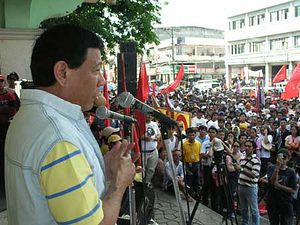Over the past few weeks, as the Philippine Congress has deliberated amendments to the anti-terror law, critics have expressed concerns that it would trample the people’s civil liberties and further enable a descent into dictatorial rule under President Rodrigo Duterte. Those concerns merit closer examination in terms of both the issue itself as well as the broader political context in the Philippines.
The anti-terror law was passed in 2007, amid protests by activists who raised alarm over the vague provisions of the measure which they claimed would be used by authorities to persecute the critics of then-President Gloria Macapagal Arroyo.
Over the years, law enforcers said the law had made it difficult for them to conduct anti-terror operations because of the penalties they may face if charged and found guilty of committing wrongful detention and torture.
These “unconscionable provisions that are anti-law enforcement” have been deleted in the bill, which is now being discussed in both Houses of Congress.
But human rights groups said this would remove important safeguards against abuses perpetrated by state forces.
They also warned that the revised definition of terrorism in the bill, which now refers to attempts to “compel a government, an international organization or any person or entity to do or to abstain from doing any act,” is too broad that it can be used to criminalize rallies, labor strikes, and other legitimate acts of redress of grievances and exercise of freedom of speech and expression.
The current law defines terrorism as an act to “coerce the government to give in to an unlawful demand.”
Other proposed amendments include the extension of detention without judicial warrant from three days to 30 days, the raising of penalty for terrorism from 40 years to life imprisonment, expanding the list of terror acts to include most crimes in the country’s penal code, conducting surveillance operations against individuals and limiting a person’s right to travel based merely on suspicion, and providing a longer period for the freezing and seizure of assets of suspected terrorists.
The International Commission of Jurists also expressed deep concern that the proposed amendment gives military personnel responsibility in countering terrorism. The group added that the amendments are incompatible with international laws and standards.
Karapatan, a local human rights group, highlighted the provision that arbitrarily proscribes and considers anyone a terrorist even on mere suspicion, without factual bases.
Opposition legislators said the bill if passed into law, will “normalize the atmosphere of martial law” in the country. They warned that the amended law can be used by Duterte to quell dissent while pushing the agenda of the ruling party to pass a new Constitution and establish a Federal Republic.
“With this power provided in the law, the Duterte administration will no longer have to bother with a nationwide declaration of martial law; the law itself provides for perpetual military rule,” said Kabataan (Youth) Partylist Representative Sarah Elago.
The National Union of Journalists of the Philippines (NUJP) said the inclusion of the Cybercrime Law as a predicate crime to terrorism “would endanger journalists the most.”
“We fear critical reports and opinion may already be called terroristic acts. Would a news article explaining the roots of “terrorism” or rebellion, which terms the government often interchanges freely, qualify as incitement? Past governments certainly viewed it this way,” according to the group’s position paper submitted to Congress.
Netizens who criticize politicians and government policies can also be accused of providing support to terrorism since cyber libel is part of the Cybercrime Law.
Aside from inciting to terrorism, the bill also proposes to criminalize the “glorification of terrorism.” Again, NUJP is worried about the implication of this. “Might not this provision be used by state forces to charge and harass members of the press who would write something about so-called terrorism, misconstruing such as glorification?”
The president’s spokesman said it is up to Congress whether or not to approve the proposed bill.
But it is expected that the amended law can be Duterte’s legal tool not only in the ‘war on terror’ but also in his ‘all-out war’ against communist rebels whom he branded as terrorists in 2017. Duterte once threatened to detain the ‘legal fronts’ of communists aside from ordering the release of a terror list which included leaders of activist groups, former legislators, and even a United Nations Special Rapporteur.
Given all this, it is understandable that there are concerns that the new terror law — which broadens the definition of terrorism, expanded the powers of the State, and removed the provisions intended to protect human rights — threatens to further undermine democracy in the Philippines and remove the legal obstacles for Duterte and the ruling party to establish a full-blown authoritarianism.

































